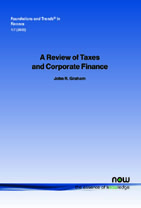A Review of Taxes and Corporate Finance
By John R. Graham, Fuqua School of Business, Duke University and NBER, john.graham@duke.edu
Abstract
This paper reviews domestic and multinational corporate tax research. For each topic, the theoretical arguments explaining how taxes can affect corporate decision-making and firm value are reviewed, followed by a summary of the related empirical evidence and a discussion of unresolved issues. Tax research generally supports the hypothesis that high-tax rate firms pursue policies that provide tax benefits. Many issues remain unresolved, however, including understanding whether tax effects are of first-order importance, why firms do not pursue tax benefits more aggressively, and whether corporate actions are affected by investor-level taxes.
A Review of Taxes and Corporate Finance
A Review of Taxes and Corporate Finance investigates the consequences of taxation on corporate finance focusing on how taxes affect corporate policies and firm value. A common theme is that tax rules affect corporate incentives and decisions. A second emphasis is on research that describes how taxes affect costs and benefits. A Review of Taxes and Corporate Finance explores the multiple avenues for taxes to affect corporate decisions including capital structure decisions, organizational form and restructurings, payout policy, compensation policy, risk management, and the use of tax shelters. The author provides a theoretical framework, empirical predictions, and empirical evidence for each of these areas. Each section concludes with a discussion of unanswered questions and possible avenues for future research. A Review of Taxes and Corporate Finance is valuable reading for researchers and professionals in corporate finance, corporate governance, public finance and tax policy.
